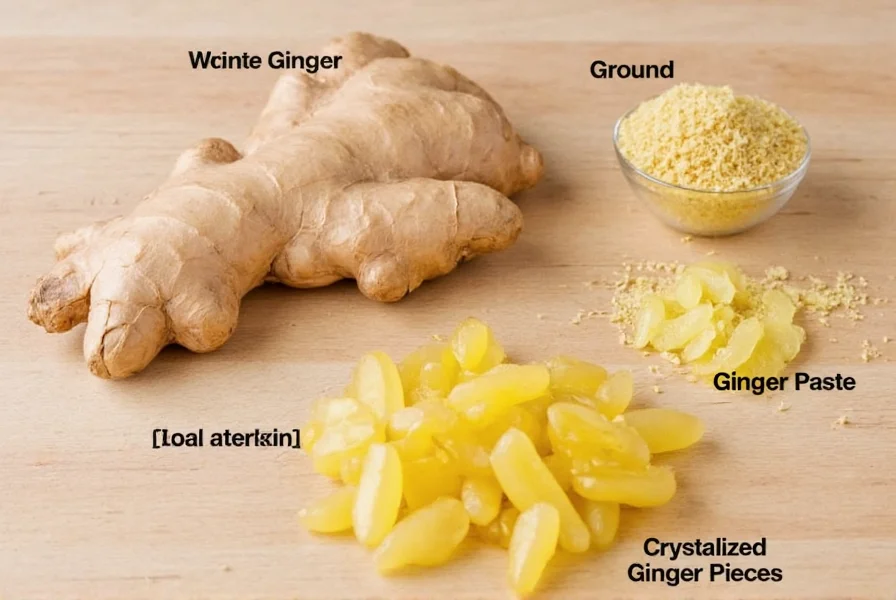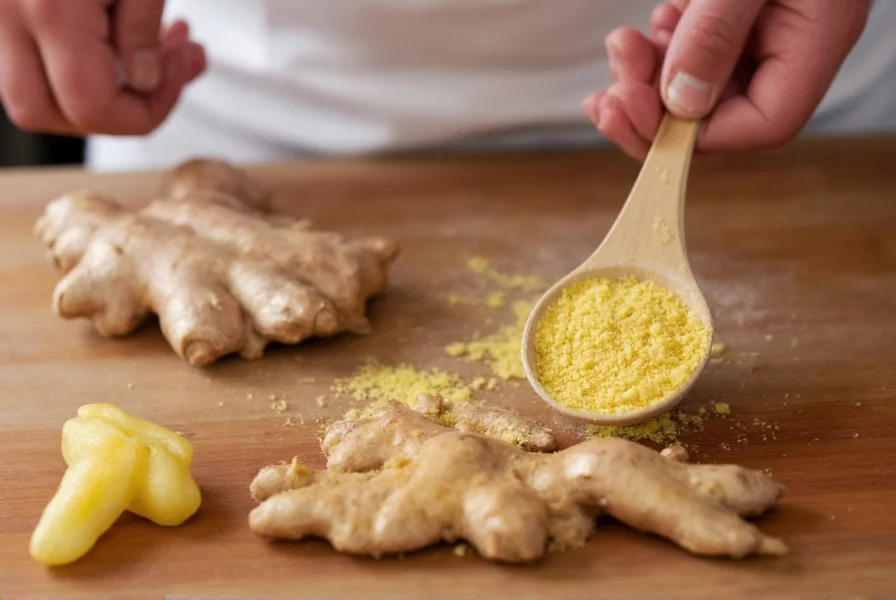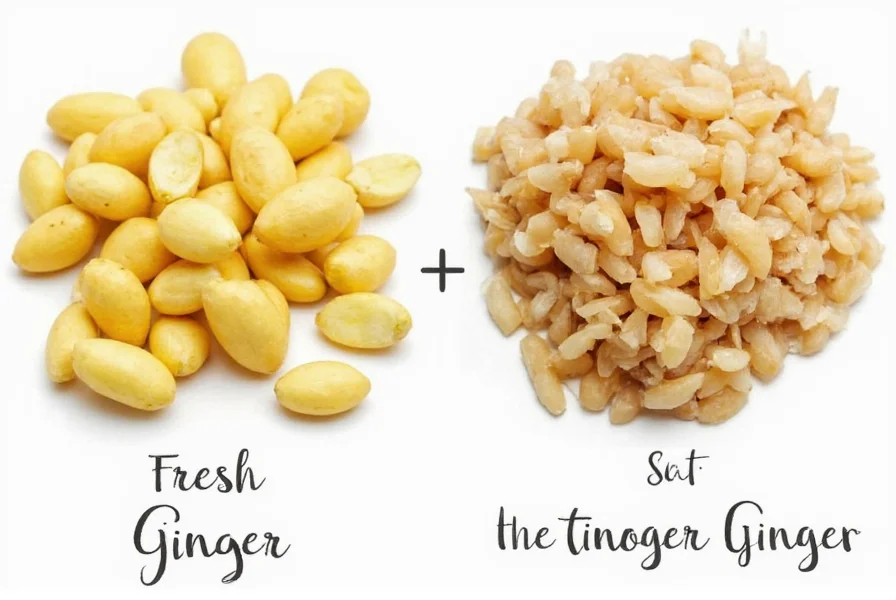The three best fresh ginger substitutions are: 1) Ground ginger (use 1/4 teaspoon ground for every 1 tablespoon fresh), 2) Ginger paste (use 1:1 ratio), and 3) Apple cider vinegar with a pinch of ground ginger (for acidic dishes). For baking, ground ginger works best; for stir-fries and curries, ginger paste or crystallized ginger steeped in liquid provides closest flavor match.
Running out of fresh ginger while cooking can derail your entire recipe. Whether you're mid-stir-fry or preparing a curry, knowing reliable ginger substitutes ensures your dish maintains that distinctive warm, spicy flavor profile. This guide provides tested alternatives with precise measurements and specific use cases so you can confidently replace fresh ginger in any recipe.
Why You Need Ginger Substitutes
Ginger's unique flavor—simultaneously spicy, warm, and slightly sweet—plays a crucial role in both savory and sweet dishes. When unavailable, improper substitutions can dramatically alter your recipe's outcome. The right alternative depends on your specific cooking application, as different substitutes excel in particular contexts while falling short in others.
Top Fresh Ginger Substitutes Ranked by Effectiveness
1. Ground Ginger (Best for Baking and Dry Rubs)
Ground ginger offers concentrated flavor but lacks the bright, zesty notes of fresh ginger. It works exceptionally well in baked goods, spice blends, and dry rubs where moisture content matters less.
Conversion ratio: Use 1/4 teaspoon ground ginger for every 1 tablespoon fresh ginger called for in your recipe. This accounts for ground ginger's more intense flavor concentration.
Best applications: Gingerbread, spice cakes, chai tea blends, and dry spice rubs. Avoid using in dishes where fresh ginger's fibrous texture contributes to mouthfeel.
2. Ginger Paste (Best All-Around Substitute)
Commercial or homemade ginger paste provides the closest flavor match to fresh ginger with convenient storage. Most quality pastes contain only ginger and a small amount of oil or water.
Conversion ratio: Substitute 1:1—1 tablespoon paste for 1 tablespoon fresh grated ginger.
Best applications: Curries, stir-fries, marinades, and sauces where fresh ginger would normally be grated. Keep in mind that some pastes contain preservatives that may slightly alter flavor in delicate dishes.
| Substitute | Conversion Ratio | Best For | Limitations |
|---|---|---|---|
| Ground ginger | 1/4 tsp = 1 tbsp fresh | Baking, dry rubs, chai | Lacks fresh zing, too strong if overused |
| Ginger paste | 1:1 replacement | Curries, stir-fries, marinades | Preservatives may affect delicate dishes |
| Crystallized ginger | 1 tbsp steeped in 2 tbsp liquid | Teas, sweet sauces, braises | Adds sweetness, requires straining |
| Ginger powder blend | 1/2 tsp blend = 1 tbsp fresh | Quick fixes, non-critical recipes | Flavor varies significantly by brand |
3. Crystallized Ginger (Best for Liquid-Based Dishes)
When steeped in hot liquid, crystallized ginger releases flavor similar to fresh while adding subtle sweetness. This works particularly well in braises, teas, and sauces.
Conversion method: Finely chop 1 tablespoon crystallized ginger and steep in 2 tablespoons of the recipe's liquid (water, broth, or sauce) for 10-15 minutes before using. Strain out solids before adding to your dish.
Best applications: Poaching liquids, tea blends, sweet-and-sour sauces, and braising liquids. The added sugar content makes it less suitable for savory dishes requiring precise seasoning.
4. Apple Cider Vinegar with Ground Ginger (Emergency Substitute)
When you have no ginger products available, this combination mimics ginger's acidic, spicy profile in a pinch.
Conversion ratio: Use 1 teaspoon apple cider vinegar plus 1/8 teaspoon ground ginger for every 1 tablespoon fresh ginger required.
Best applications: Salad dressings, quick pickles, and acidic dishes where ginger's heat matters less than its bright flavor component. This substitute won't work for dishes relying on ginger's distinctive warmth.
Special Considerations for Specific Dishes
Fresh ginger substitute for baking
Ground ginger remains the superior choice for baked goods. For ginger cookies or cakes, increase the ground ginger by 1/8 teaspoon and add 1/4 teaspoon lemon zest to approximate fresh ginger's brightness. In yeast breads, reduce liquid by 1 teaspoon when substituting ground ginger to account for fresh ginger's moisture content.
Fresh ginger alternative in stir fry
Ginger paste provides the most authentic texture and flavor release in high-heat cooking. If unavailable, create a quick substitute by mixing 1/2 teaspoon ground ginger with 1 teaspoon water and 1/4 teaspoon neutral oil. Add this mixture at the same point you would fresh ginger in your stir-fry process.
How to replace fresh ginger in curry
For Indian and Thai curries, ginger paste delivers the most authentic results. In a pinch, combine ground ginger with a small amount of galangal powder (if available) at a 3:1 ratio to better approximate fresh ginger's complex flavor profile. Always add ginger substitutes early in the cooking process to allow flavors to meld properly.
What NOT to Use as Ginger Substitutes
Certain common suggestions create disappointing results:
- Allspice: Creates an entirely different flavor profile despite some superficial similarities
- Nutmeg alone: Lacks ginger's heat and becomes bitter when substituted directly
- Ginger ale or ginger beer: Adds excessive sweetness and carbonation that alters dish texture
- Horseradish: Provides heat but misses ginger's distinctive warm, citrusy notes
Storage Implications of Ginger Substitutes
Unlike fresh ginger, which lasts 2-3 weeks refrigerated, most substitutes have different storage requirements. Ground ginger maintains potency for 6-12 months in a cool, dark place but gradually loses volatile compounds. Ginger paste typically lasts 3-4 weeks refrigerated after opening. For long-term storage solutions, consider freezing grated fresh ginger in ice cube trays with a small amount of water—a technique that preserves flavor better than most commercial substitutes.

Final Recommendations for Fresh Ginger Substitution
The ideal substitute depends entirely on your specific recipe. For baking, ground ginger provides reliable results with proper measurement adjustments. In savory dishes requiring ginger's distinctive bite, ginger paste delivers the most authentic experience. When time allows, steeping crystallized ginger in recipe liquid creates surprisingly close flavor replication. Always adjust salt and sweetener levels when substituting, as different ginger forms affect overall seasoning balance.

Can I use ground ginger instead of fresh in tea?
Yes, but use only 1/8 teaspoon ground ginger per cup of tea, as it's more concentrated. For better results, steep a small piece of crystallized ginger in your tea instead, as it provides fresher flavor without the dusty texture of ground ginger.
What's the best ginger substitute for sushi ginger?
Fresh ginger is essential for proper sushi ginger (gari) due to its specific texture and flavor release. No adequate substitute exists, though in emergencies you could use very thinly sliced crystallized ginger rinsed briefly to remove excess sugar, but the result will differ significantly from authentic gari.
How do I substitute fresh ginger in a smoothie?
For smoothies, ginger paste works best at a 1:1 ratio. If unavailable, add 1/4 teaspoon ground ginger along with a squeeze of lemon juice to approximate fresh ginger's bright quality. Start with smaller amounts and adjust to taste, as smoothie ingredients can mask ginger's heat.
Does ground ginger have the same health benefits as fresh?
Ground ginger retains many beneficial compounds but loses some volatile oils during processing. It contains higher concentrations of certain antioxidants due to dehydration, but fresh ginger provides more zingiberene—the compound responsible for much of ginger's distinctive flavor and some health properties. For therapeutic use, fresh ginger generally offers more comprehensive benefits.
Can I make my own ginger paste as a fresh ginger substitute?
Absolutely. Blend peeled ginger with just enough neutral oil or water to create a smooth paste. Store in an airtight container in the refrigerator for up to 4 weeks or freeze in ice cube trays for longer storage. This homemade paste makes an excellent 1:1 substitute for fresh grated ginger in most recipes.
Frequently Asked Questions
Can I use ground ginger instead of fresh in tea?
Yes, but use only 1/8 teaspoon ground ginger per cup of tea, as it's more concentrated. For better results, steep a small piece of crystallized ginger in your tea instead, as it provides fresher flavor without the dusty texture of ground ginger.
What's the best ginger substitute for sushi ginger?
Fresh ginger is essential for proper sushi ginger (gari) due to its specific texture and flavor release. No adequate substitute exists, though in emergencies you could use very thinly sliced crystallized ginger rinsed briefly to remove excess sugar, but the result will differ significantly from authentic gari.
How do I substitute fresh ginger in a smoothie?
For smoothies, ginger paste works best at a 1:1 ratio. If unavailable, add 1/4 teaspoon ground ginger along with a squeeze of lemon juice to approximate fresh ginger's bright quality. Start with smaller amounts and adjust to taste, as smoothie ingredients can mask ginger's heat.
Does ground ginger have the same health benefits as fresh?
Ground ginger retains many beneficial compounds but loses some volatile oils during processing. It contains higher concentrations of certain antioxidants due to dehydration, but fresh ginger provides more zingiberene—the compound responsible for much of ginger's distinctive flavor and some health properties. For therapeutic use, fresh ginger generally offers more comprehensive benefits.
Can I make my own ginger paste as a fresh ginger substitute?
Absolutely. Blend peeled ginger with just enough neutral oil or water to create a smooth paste. Store in an airtight container in the refrigerator for up to 4 weeks or freeze in ice cube trays for longer storage. This homemade paste makes an excellent 1:1 substitute for fresh grated ginger in most recipes.











 浙公网安备
33010002000092号
浙公网安备
33010002000092号 浙B2-20120091-4
浙B2-20120091-4